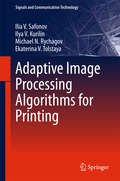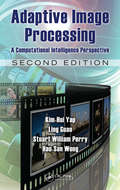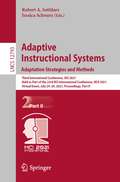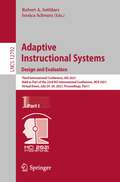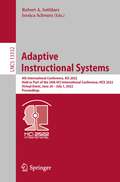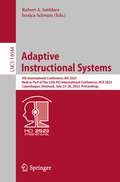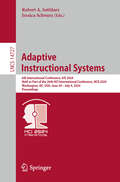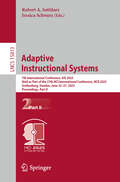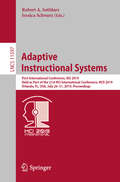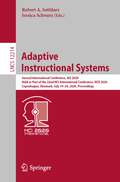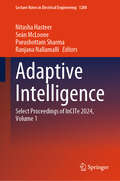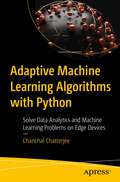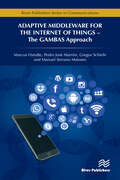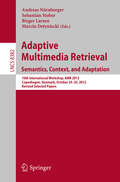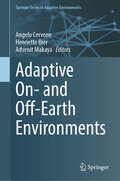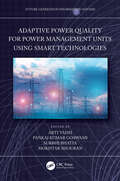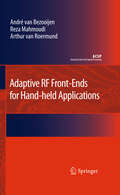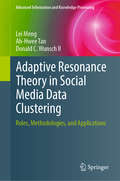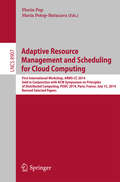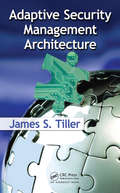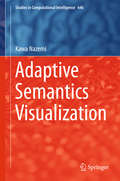- Table View
- List View
Adaptive Image Processing Algorithms for Printing (Signals and Communication Technology)
by Ilia V. Safonov Ilya V. Kurilin Michael N. Rychagov Ekaterina V. TolstayaThis book presents essential algorithms for the image processing pipeline of photo-printers and accompanying software tools, offering an exposition of multiple image enhancement algorithms, smart aspect-ratio changing techniques for borderless printing and approaches for non-standard printing modes. All the techniques described are content-adaptive and operate in an automatic mode thanks to machine learning reasoning or ingenious heuristics. The first part includes algorithms, for example, red-eye correction and compression artefacts reduction, that can be applied in any photo processing application, while the second part focuses specifically on printing devices, e. g. eco-friendly and anaglyph printing. The majority of the techniques presented have a low computational complexity because they were initially designed for integration in system-on-chip. The book reflects the authors' practical experience in algorithm development for industrial R&D.
Adaptive Image Processing: A Computational Intelligence Perspective, Second Edition (Image Processing Series)
by Ling Guan Kim-Hui Yap Stuart William Perry Hau San WongIllustrating essential aspects of adaptive image processing from a computational intelligence viewpoint, the second edition of Adaptive Image Processing: A Computational Intelligence Perspective provides an authoritative and detailed account of computational intelligence (CI) methods and algorithms for adaptive image processing in regularization, edge detection, and early vision. With three new chapters and updated information throughout, the new edition of this popular reference includes substantial new material that focuses on applications of advanced CI techniques in image processing applications. It introduces new concepts and frameworks that demonstrate how neural networks, support vector machines, fuzzy logic, and evolutionary algorithms can be used to address new challenges in image processing, including low-level image processing, visual content analysis, feature extraction, and pattern recognition. Emphasizing developments in state-of-the-art CI techniques, such as content-based image retrieval, this book continues to provide educators, students, researchers, engineers, and technical managers in visual information processing with the up-to-date understanding required to address contemporary challenges in image content processing and analysis.
Adaptive Instructional Systems. Adaptation Strategies and Methods: Third International Conference, AIS 2021, Held as Part of the 23rd HCI International Conference, HCII 2021, Virtual Event, July 24–29, 2021, Proceedings, Part II (Lecture Notes in Computer Science #12793)
by Jessica Schwarz Robert A. SottilareThis two-volume set LNCS 12774 and 12775 constitutes the refereed proceedings of the 12th International Conference on Social Computing and Social Media, SCSM 2021, held as part of the 23rd International Conference, HCI International 2021, which took place in July 2021. Due to COVID-19 pandemic the conference was held virtually. The total of 1276 papers and 241 poster papers included in the 39 HCII 2021 proceedings volumes was carefully reviewed and selected from 5222 submissions. The regular papers of AIS 2021, Part II, focus on Learner Modelling and State Assessment in AIS.
Adaptive Instructional Systems. Design and Evaluation: Third International Conference, AIS 2021, Held as Part of the 23rd HCI International Conference, HCII 2021, Virtual Event, July 24–29, 2021, Proceedings, Part I (Lecture Notes in Computer Science #12792)
by Jessica Schwarz Robert A. SottilareThis two-volume set LNCS 12792 and 12793 constitutes the refereed proceedings of the Third International Conference on Adaptive Instructional Systems, AIS 2021, held as Part of the 23rd International Conference, HCI International 2021, which took place in July 2021. Due to COVID-19 pandemic the conference was held virtually.The total of 1276 papers and 241 poster papers included in the 39 HCII 2021 proceedings volumes was carefully reviewed and selected from 5222 submissions. The regular papers of AIS 2021, Part I, are organized in topical sections named: Conceptual Models and Instructional Approaches for AIS; Designing and Developing AIS; Evaluation of AIS; Adaptation Strategies and Methods in AIS.
Adaptive Instructional Systems: 4th International Conference, AIS 2022, Held as Part of the 24th HCI International Conference, HCII 2022, Virtual Event, June 26 – July 1, 2022, Proceedings (Lecture Notes in Computer Science #13332)
by Jessica Schwarz Robert A. SottilareThis book constitutes the refereed proceedings of the 4th International Conference on Adaptive Instructional Systems, AIS 2022, held as part of the 23rd International Conference, HCI International 2022, which was held virtually in June/July 2022.The total of 1271 papers and 275 posters included in the HCII 2022 proceedings was carefully reviewed and selected from 5487 submissions. The AIS 2022 proceedings were organized in the following topical sections: Learner Modeling and State Assessment for Adaptive Instructional Decisions; Adaptation Design to Individual Learners and Teams; Design and Development of Adaptive Instructional Systems; Evaluating the Effectiveness of Adaptive Instructional Systems.
Adaptive Instructional Systems: 5th International Conference, AIS 2023, Held as Part of the 25th HCI International Conference, HCII 2023, Copenhagen, Denmark, July 23–28, 2023, Proceedings (Lecture Notes in Computer Science #14044)
by Jessica Schwarz Robert A. SottilareThis book constitutes the refereed proceedings of the 5th International Conference, AIS 2023, held as part of the 25th International Conference, HCI International 2023, which was held virtually in Copenhagen, Denmark in July 2023.The total of 1578 papers and 396 posters included in the HCII 2023 proceedings was carefully reviewed and selected from 7472 submissions. The AIS 2023 proceeding helps to understand the theory and enhance the state-of-practice for a set of technologies (tools and methods) called adaptive instructional systems (AIS). AIS are defined as artificially intelligent, computer-based systems that guide learning experiences by tailoring instruction and recommendations based on the goals, needs, preferences, and interests of each individual learner or team in the context of domain learning objectives.
Adaptive Instructional Systems: 6th International Conference, AIS 2024, Held as Part of the 26th HCI International Conference, HCII 2024, Washington, DC, USA, June 29–July 4, 2024, Proceedings (Lecture Notes in Computer Science #14727)
by Jessica Schwarz Robert A. SottilareThis book constitutes the refereed proceedings of 6th International Conference on Adaptive Instructional Systems, AIS 2024, held as part of the 26th International Conference, HCI International 2024, which took place in Washington, DC, USA, during June 29-July 4, 2024. The total of 1271 papers and 309 posters included in the HCII 2024 proceedings was carefully reviewed and selected from 5108 submissions. The HCII-AIS 2024 contributions have been organized in the following topical sections: Designing and developing adaptive instructional systems; adaptive learning experiences; AI in adaptive learning.
Adaptive Instructional Systems: 7th International Conference, AIS 2025, Held as Part of the 27th HCI International Conference, HCII 2025, Gothenburg, Sweden, June 22–27, 2025, Proceedings, Part I (Lecture Notes in Computer Science #15812)
by Jessica Schwarz Robert A. SottilareThe two-volume set LNCS 15812-15813 constitutes the thoroughly refereed proceedings of the 7th International Conference on Adaptive Instructional Systems, AIS 2025, held as part of the 27th HCI International Conference on Human-Computer Interaction, HCII 2025, which took place in Gothenburg, Sweden, in June 2025. The total of 1430 papers and 355 posters included in the HCII 2025 proceedings was carefully reviewed and selected from 7972 submissions. The two volumes cover topics as follows: Part I: Adaptive Training and Education; Cognitive Modeling of Adaptive Instructional Systems; Part II: Adaptive and Personalized Learning; Emerging Technologies in Adaptive Instruction.
Adaptive Instructional Systems: 7th International Conference, AIS 2025, Held as Part of the 27th HCI International Conference, HCII 2025, Gothenburg, Sweden, June 22–27, 2025, Proceedings, Part II (Lecture Notes in Computer Science #15813)
by Jessica Schwarz Robert A. SottilareThe two-volume set LNCS 15812-15813 constitutes the thoroughly refereed proceedings of the 7th International Conference on Adaptive Instructional Systems, AIS 2025, held as part of the 27th HCI International Conference on Human-Computer Interaction, HCII 2025, which took place in Gothenburg, Sweden, in June 2025. The total of 1430 papers and 355 posters included in the HCII 2025 proceedings was carefully reviewed and selected from 7972 submissions. The two volumes cover topics as follows: Part I: Adaptive Training and Education; Cognitive Modeling of Adaptive Instructional Systems; Part II: Adaptive and Personalized Learning; Emerging Technologies in Adaptive Instruction.
Adaptive Instructional Systems: First International Conference, AIS 2019, Held as Part of the 21st HCI International Conference, HCII 2019, Orlando, FL, USA, July 26–31, 2019, Proceedings (Lecture Notes in Computer Science #11597)
by Jessica Schwarz Robert A. SottilareThis book constitutes the refereed proceedings of the First International Conference on Adaptive Instructional Systems, AIS 2019, held in July 2019 as part of HCI International 2019 in Orlando, FL, USA. HCII 2019 received a total of 5029 submissions, of which 1275 papers and 209 posters were accepted for publication after a careful reviewing process. The 50 papers presented in this volume are organized in topical sections named: Adaptive Instruction Design and Authoring, Interoperability and Standardization in Adaptive Instructional Systems, Instructional Theories in Adaptive Instruction, Learner Assessment and Modelling, AI in Adaptive Instructional Systems, Conversational Tutors.
Adaptive Instructional Systems: Second International Conference, AIS 2020, Held as Part of the 22nd HCI International Conference, HCII 2020, Copenhagen, Denmark, July 19–24, 2020, Proceedings (Lecture Notes in Computer Science #12214)
by Jessica Schwarz Robert A. SottilareThis volume constitutes the refereed proceedings of the Second International Conference on Adaptive Instructional Systems, AIS 2020, which was due to be held in July 2020 as part of HCI International 2020 in Copenhagen, Denmark. The conference was held virtually due to the COVID-19 pandemic.A total of 1439 papers and 238 posters have been accepted for publication in the HCII 2020 proceedings from a total of 6326 submissions. The 41 papers presented in this volume were organized in topical sections as follows: designing and developing adaptive instructional systems; learner modelling and methods of adaptation; evaluating the effectiveness of adaptive instructional systems.Chapter "Exploring Video Engagement in an Intelligent Tutoring System" is available open access under a Creative Commons Attribution 4.0 International License via link.springer.com.
Adaptive Intelligence: Select Proceedings of InCITe 2024, Volume 1 (Lecture Notes in Electrical Engineering #1280)
by Seán McLoone Nitasha Hasteer Purushottam Sharma Ranjana NallamalliThis book comprises the select peer-reviewed proceedings of the 4th International Conference on Information Technology (InCITe-2024). It aims to provide a comprehensive knowledge base encompassing state-of-the-art research and development in adaptive intelligence, decision intelligence, artificial intelligence, deep learning, machine learning, data science, and enabling technologies for IoT, blockchain, and other futuristic technologies. It covers various topics that span cutting-edge, collaborative technologies and areas of computation. The content would serve as a rich knowledge repository on information & communication technologies, neural networks, fuzzy systems, natural language processing, data mining & warehousing, big data analytics, cloud computing, social networks, and intelligence, decision-making, and modeling, information systems, IT architectures, and security related aspects. This book provides a valuable resource for those in academia and industry.
Adaptive Machine Learning Algorithms with Python: Solve Data Analytics and Machine Learning Problems on Edge Devices
by Chanchal ChatterjeeLearn to use adaptive algorithms to solve real-world streaming data problems. This book covers a multitude of data processing challenges, ranging from the simple to the complex. At each step, you will gain insight into real-world use cases, find solutions, explore code used to solve these problems, and create new algorithms for your own use. Authors Chanchal Chatterjee and Vwani P. Roychowdhury begin by introducing a common framework for creating adaptive algorithms, and demonstrating how to use it to address various streaming data issues. Examples range from using matrix functions to solve machine learning and data analysis problems to more critical edge computation problems. They handle time-varying, non-stationary data with minimal compute, memory, latency, and bandwidth. Upon finishing this book, you will have a solid understanding of how to solve adaptive machine learning and data analytics problems and be able to derive new algorithms for your own use cases. You will also come away with solutions to high volume time-varying data with high dimensionality in a low compute, low latency environment. What You Will Learn Apply adaptive algorithms to practical applications and examplesUnderstand the relevant data representation features and computational models for time-varying multi-dimensional dataDerive adaptive algorithms for mean, median, covariance, eigenvectors (PCA) and generalized eigenvectors with experiments on real dataSpeed up your algorithms and put them to use on real-world stationary and non-stationary dataMaster the applications of adaptive algorithms on critical edge device computation applications Who This Book Is ForMachine learning engineers, data scientist and architects, software engineers and architects handling edge device computation and data management.
Adaptive Middleware for the Internet of Things: The GAMBAS Approach
by Pedro José Marrón Gregor Schiele Marcus Handte Matoses Manuel SerranoOver the past years, a considerable amount of effort has been devoted, both in industry and academia, towards the development of basic technology as well as innovative applications for the Internet of Things. Adaptive Middleware for the Internet of Things introduces a scalable, interoperable and privacy-preserving approach to realize IoT applications and discusses abstractions and mechanisms at the middleware level that simplify the realization of services that can adapt autonomously to the behavior of their users. Technical topics discussed in the book include:Behavior-driven Autonomous ServicesGAMBAS Middleware ArchitectureGeneric and Efficient Data AcquisitionInteroperable and Scalable Data ProcessingAutomated Privacy PreservationAdaptive Middleware for the Internet of Things summarizes the results of the GAMBAS research project funded by the European Commission under Framework Programme 7. It provides an in-depth description of the middleware system developed by the project consortium. In addition, the book describes several innovative mobility and monitoring applications that have been built, deployed and operated to evaluate the middleware under realistic conditions with a large number of users. Adaptive Middleware for the Internet of Things is ideal for personnel in the computer and communication industries as well as academic staff and research students in computer science interested in the development of systems and applications for the Internet of Things.
Adaptive Multimedia Retrieval: 10th International Workshop, AMR 2012, Copenhagen, Denmark, October 24-25, 2012, Revised Selected Papers (Lecture Notes in Computer Science #8382)
by Birger Larsen Andreas Nürnberger Sebastian Stober Marcin DetynieckiThis book constitutes the thoroughly refereed post-conference proceedings of the 10th International Conference on Adaptive Multimedia Retrieval, AMR 2012, held in Copenhagen, Denmark, in October 2012. The 17 revised full papers presented were carefully reviewed and selected from numerous submissions. The papers cover topics of state of the art contributions, features and classification, location context, language and semantics, music retrieval, and adaption and HCI.
Adaptive On- and Off-Earth Environments (Springer Series in Adaptive Environments)
by Henriette Bier Angelo Cervone Advenit MakayaThis volume investigates the challenges and opportunities for designing, manufacturing and operating off-Earth infrastructures in order to establish adaptive human habitats. The adaptive aspects are considered with respect to the development of adequate infrastructures designed to support human activities. Given the limitations in bringing materials from Earth, utilisation of in-situ resources is crucial for establishing and maintaining these infrastructures.Adaptive on-and off-Earth Environments focuses, among other aspects, on the design, production, and operation processes required to build and maintain such off-Earth infrastructures, while heavily relying on In-Situ Resource Utilisation (ISRU). Such design, production, and operation processes integrate cyber-physical approaches developed and tested on Earth. The challenge is to adapt on-Earth approaches to off-Earth applications aiming at technology advancement and ultimately transfer from on- to off-Earth research. Thischallenge is addressed with contributions from various disciplines ranging from power generation to architecture, construction, and materials engineering involving ISRU for manufacturing processes. All chapters, related to these disciplines, are structured with an emphasis on computing and adaptivity of on-Earth technology to off-Earth applications and vice versa to serve society at large.
Adaptive Power Quality for Power Management Units using Smart Technologies (Future Generation Information Systems)
by Surbhi Bhatia Arti Vaish Pankaj Kumar Goswami Mokhtar ShouranThis book covers issues associated with smart systems due to the presence of onboard nonlinear components. It discusses the advanced architecture of smart systems for power management units. It explores issues of power management and identifies hazardous signals in the power management units of smart devices. It Presents adaptive artificial intelligence and machine learning-based control strategies. Discusses advanced simulations and data synthesis for various power management issues. Showcases solutions to the uncertainty and reliability issues in power management units. Identifies new power quality challenges in smart devices. Explains hybrid active power filters, shunt hybrid active power filters, and the industrial internet of things in power quality management. This book comprehensively discusses advancements of traditional electrical grids, the benefits of smart grids to customers and stakeholders, properties of smart grids, smart grid architecture, smart grid communication, and smart grid security. It further covers the architecture of advance power management units (PMU) of smart devices, and the identification of harmonic distortions with respect to various sensor-based technology. It will serve as an ideal reference text for senior undergraduate and graduate students, and academic researchers in fields including electrical engineering, electronics, communications engineering, and computer engineering.
Adaptive RF Front-Ends for Hand-held Applications (Analog Circuits and Signal Processing)
by Reza Mahmoudi Arthur H.M. van Roermund Andre Van BezooijenThe RF front-end - antenna combination is a vital part of a mobile phone because its performance is very relevant to the link quality between hand-set and cellular network base-stations. The RF front-end performance suffers from changes in operating environment, like hand-effects, that are often unpredictable. Adaptive RF Front-Ends for Hand-Held Applications presents an analysis on the impact of fluctuating environmental parameters. In order to overcome undesired behavior two different adaptive control methods are treated that make RF frond-ends more resilient: adaptive impedance control, and adaptive power control. Several adaptive impedance control techniques are discussed, using a priori knowledge on matching network properties, in order to simplify robust 2-dimensional control. A generic protection concept is presented, based on adaptive power control, which improves the ruggedness of a power amplifier or preserves its linearity under extremes. It comprises over-voltage, over-temperature, and under-voltage protection.
Adaptive Resonance Theory in Social Media Data Clustering: Roles, Methodologies, and Applications (Advanced Information and Knowledge Processing)
by Lei Meng Ah-Hwee Tan Donald C. Wunsch IISocial media data contains our communication and online sharing, mirroring our daily life. This book looks at how we can use and what we can discover from such big data:Basic knowledge (data & challenges) on social media analyticsClustering as a fundamental technique for unsupervised knowledge discovery and data miningA class of neural inspired algorithms, based on adaptive resonance theory (ART), tackling challenges in big social media data clustering Step-by-step practices of developing unsupervised machine learning algorithms for real-world applications in social media domainAdaptive Resonance Theory in Social Media Data Clustering stands on the fundamental breakthrough in cognitive and neural theory, i.e. adaptive resonance theory, which simulates how a brain processes information to perform memory, learning, recognition, and prediction.It presents initiatives on the mathematical demonstration of ART’s learning mechanisms in clustering, and illustrates how to extend the base ART model to handle the complexity and characteristics of social media data and perform associative analytical tasks.Both cutting-edge research and real-world practices on machine learning and social media analytics are included in the book and if you wish to learn the answers to the following questions, this book is for you:How to process big streams of multimedia data?How to analyze social networks with heterogeneous data?How to understand a user’s interests by learning from online posts and behaviors?How to create a personalized search engine by automatically indexing and searching multimodal information resources? .
Adaptive Resource Management and Scheduling for Cloud Computing: First International Workshop, ARMS-CC 2014, held in Conjunction with ACM Symposium on Principles of Distributed Computing, PODC 2014, Paris, France, July 15, 2014, Revised Selected Papers (Lecture Notes in Computer Science #8907)
by Florin Pop Maria Potop-ButucaruThis book constitutes the thoroughly refereedpost-conference proceedings of the Second International Workshop on AdaptiveResource Management and Scheduling for Cloud Computing, ARMS-CC 2015, held inConjunction with ACM Symposium on Principles of Distributed Computing, PODC2015, in Donostia-San Sebastián, Spain, in July 2015. The 12 revised full papers, including 1 invited paper,were carefully reviewed and selected from 24 submissions. The papers haveidentified several important aspects of the problem addressed by ARMS-CC:self-* and autonomous cloud systems, cloud quality management and service levelagreement (SLA), scalable computing, mobile cloud computing, cloud computingtechniques for big data, high performance cloud computing, resource managementin big data platforms, scheduling algorithms for big data processing, cloudcomposition, federation, bridging, and bursting, cloud resource virtualizationand composition, load-balancing and co-allocation, fault tolerance,reliability, and availability of cloud systems.
Adaptive Security Management Architecture
by James S. TillerThis volume enables security professionals to structure the best security program designed to meet the complex needs of an entire organization, taking into account the organization's business goals as well as the surrounding controls, processes, and units already in existence. The book explains how an organization can develop an adaptive security program closely aligned to business needs, making it an enabling force that helps the organization achieve its goals and objectives. It presents the end product of a successful security management system and examines the finer points of how it can be accomplished.
Adaptive Semantics Visualization (Studies in Computational Intelligence #646)
by Kawa NazemiThis bookintroduces a novel approach for intelligent visualizations that adapts thedifferent visual variables and data processing to human's behavior and giventasks. Thereby a number of new algorithms and methods are introduced to satisfythe human need of information and knowledge and enable a usable and attractiveway of information acquisition. Each method and algorithm is illustrated in areplicable way to enable the reproduction of the entire "SemaVis" system orparts of it. The introduced evaluation is scientifically well-designed andperformed with more than enough participants to validate the benefits of themethods. Beside the introduced new approaches and algorithms, readers may finda sophisticated literature review in Information Visualization and VisualAnalytics, Semantics and information extraction, and intelligent and adaptivesystems. This book is based on an awarded and distinguished doctoral thesis incomputer science.
Adaptive Technologies for Training and Education
by Paula J. Durlach Alan M. LesgoldThis edited volume provides an overview of the latest advancements in adaptive training technology. Intelligent tutoring has been deployed for well-defined and relatively static educational domains such as algebra and geometry. However, this adaptive approach to computer-based training has yet to come into wider usage for domains that are less well defined or where student-system interactions are less structured, such as during scenario-based simulation and immersive serious games. In order to address how to expand the reach of adaptive training technology to these domains, leading experts in the field present their work in areas such as student modeling, pedagogical strategy, knowledge assessment, natural language processing and virtual human agents. Several approaches to designing adaptive technology are discussed for both traditional educational settings and professional training domains. This book will appeal to anyone concerned with educational and training technology at a professional level, including researchers, training systems developers and designers.
Adaptive Technology for the Internet: Making Electronic Resources Accessible to All
by Barbara T. MatesIs your site accessible? Can helen keller access your site? With all the new technology and our societies reliance on technology the demand for assistive technology increases. Read about different pieces of equipment that can make surfing the net more enjoyable for those with disabilities.
Adaptive Web Design: Crafting Rich Experiences with Progressive Enhancement
by Aaron GustafsonBuilding an elegant, functional website requires more than just knowing how to code. In Adaptive Web Design, Second Edition, you'll learn how to use progressive enhancement to build websites that work anywhere, won't break, are accessible by anyone--on any device--and are designed to work well into the future. This new edition of Adaptive Web Design frames even more of the web design process in the lens of progressive enhancement. You will learn how content strategy, UX, HTML, CSS, responsive web design, JavaScript, server-side programming, and performance optimization all come together in the service of users on whatever device they happen to use to access the web. Understanding progressive enhancement will make you a better web professional, whether you're a content strategist, information architect, UX designer, visual designer, front-end developer, back-end developer, or project manager. It will enable you to visualize experience as a continuum and craft interfaces that are capable of reaching more users while simultaneously costing less money to develop. When you've mastered the tenets and concepts of this book, you will see the web in a whole new way and gain web design superpowers that will make you invaluable to your employer, clients, and the web as a whole. Visit http://adaptivewebdesign. info to learn more.
